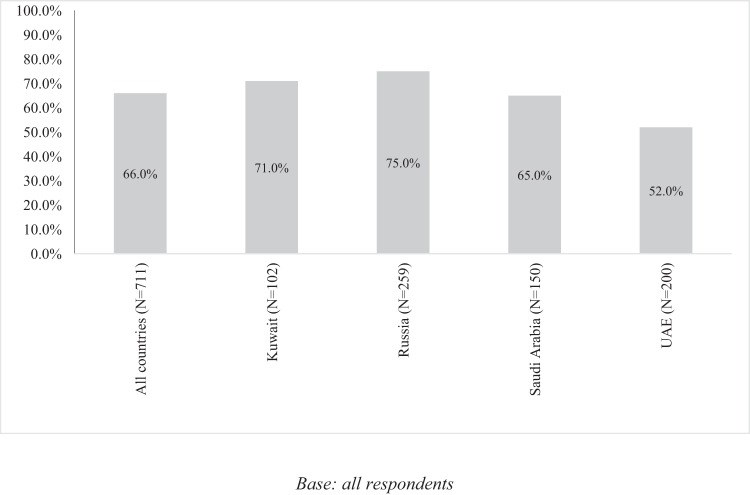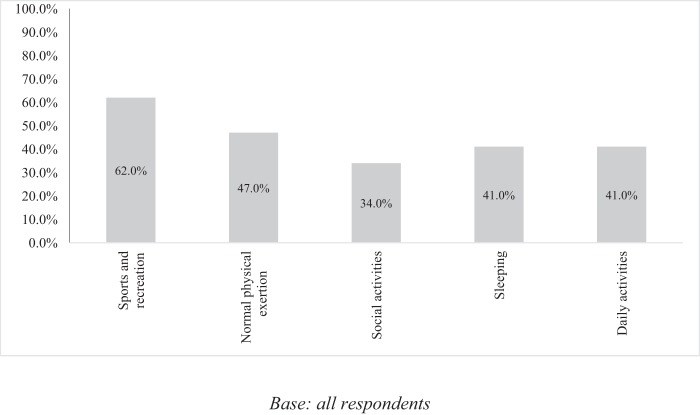Cross-sectional study on Asthma Insights and Management in the Gulf and Russia
Affiliations
Affiliations
- From the Division of Respirology, Zayed Military Hospital, Abu Dhabi, United Arab Emirates.
- Pulmonary Division, Prince Sultan Military Medical City, Riyadh, Kingdom of Saudi Arabia.
- Department of Medicine, Kuwait University, Kuwait City, Kuwait.
- Immunology Department, National Research Center Institute of Immunology, Federal Medical Biological Agency, Moscow, Russia.
- Center for Observational and Real-World Evidence (CORE), Merck & Co., Inc., Kenilworth, New Jersey.
- Global Medical Affairs, Merck & Co. Inc., Kenilworth, New Jersey.
- Real-World & Analytics Solutions, IQVIA, Dubai, United Arab Emirates.
Abstract
Background: Asthma is a chronic and complex lung disease that is not completely understood. It involves airway inflammation, reversible airflow obstruction, and bronchial hyperresponsiveness. The most common symptoms are recurrent wheezing, chest tightness, shortness of breath, and coughing.
Objective: The Asthma Insights and Management study gathered information on the burden of asthma in the Gulf region (United Arab Emirates, Kuwait, Saudi Arabia) and Russia.
Methods: This was a cross-sectional, multinational, noninterventional, two-phase study that collected data from patients ages ≥ 12 years, through interviews and a survey questionnaire. Phase 1 consisted of survey questions focused on estimating the asthma prevalence in the community. Phase 2 was designed to assess the level of asthma control, asthma-related perceptions and behaviors, and presentation patterns. Data were summarized by using descriptive analyses.
Results: Analysis of data of 711 patients revealed that the prevalence of asthma among patients who lived in the community was 7.9% and that 66% subjectively perceived their asthma as being controlled. However, 97% of the patients' asthma were partially controlled or uncontrolled based on the Global initiative for Asthma control classification. Troubling symptoms were daytime coughing (33.3%) and shortness of breath (20.3%). With respect to medications for asthma, 76.2% of the patients reported the use of quick relief medication and 80.8% of maintenance medication during the past 4 weeks. Asthma exacerbation in the past year was reported by 40% of adults and adolescents in the study.
Conclusion: The results showed that a significant proportion of the patients experienced bothersome symptoms and that many had a lack of knowledge about asthma control and treatment recommendations, which indicated that there is a need for improvements in patient education and asthma care in the Gulf and Russia regions.
Conflict of interest statement
K. Tunceli and E. Urdaneta are employed at Merck & Sharp Dohme Corp. (MSD) and Kaan Tunceli has stock (options) in MSD. The remaining authors have no conflicts to declare pertaining to this article
Figures
Similar articles
Alzaabi A, Idrees M, Behbehani N, Salah F.Allergy Asthma Proc. 2021 May 1;42(3):e77-e85. doi: 10.2500/aap.2021.42.210027.PMID: 33980343
Tarraf H, Aydin O, Mungan D, Albader M, Mahboub B, Doble A, Lahlou A, Tariq L, Aziz F, El Hasnaoui A.BMC Pulm Med. 2018 May 11;18(1):68. doi: 10.1186/s12890-018-0621-9.PMID: 29751756 Free PMC article.
Abdulrahman H, Hadi U, Tarraf H, Gharagozlou M, Kamel M, Soliman A, Hamad WA, Hanna KM, Mostafa BE, Omrani M, Abdelmotal A, Moukarzel N.Am J Rhinol Allergy. 2012 Nov-Dec;26 Suppl 1:S3-23. doi: 10.2500/ajra.2012.26.3836.PMID: 23232281
The prevalence of asthma and related symptoms in Middle East countries.
Alavinezhad A, Boskabady MH.Clin Respir J. 2018 Mar;12(3):865-877. doi: 10.1111/crj.12655. Epub 2017 Jun 12.PMID: 28544458 Review.
Potential causes of asthma in the United Arab Emirates: drawing insights from the Arabian Gulf.
Dalibalta S, Samara F, Qadri H, Adouchana H.Rev Environ Health. 2018 Jun 27;33(2):205-212. doi: 10.1515/reveh-2017-0030.PMID: 29664734 Review.
Cited by
Asthma control in Kazakhstan: need for urgent action.
Vinnikov D, Raushanova A, Mukatova I, Nurpeissov T, Кushekbayeva A, Toxarina A, Yessimova B, Bespayeva F, Brimkulov N.BMC Pulm Med. 2023 Jan 7;23(1):7. doi: 10.1186/s12890-022-02287-2.PMID: 36611130 Free PMC article.
Impact of refractory and unexplained chronic cough on disease burden: a qualitative study.
Ueda N, Yakushiji A, Schelfhout J, Tokita S, Kubo T.BMC Pulm Med. 2022 Oct 1;22(1):372. doi: 10.1186/s12890-022-02171-z.PMID: 36182896 Free PMC article.
Alzaabi A, Al Busaidi N, Pradhan R, Shandy F, Ibrahim N, Ashtar M, Khudadah K, Hegazy K, Samir M, Negm M, Farouk H, Al Khalidi A, Beekman M.Asthma Res Pract. 2022 Jul 7;8(1):3. doi: 10.1186/s40733-022-00085-5.PMID: 35799290 Free PMC article.
Al Mazrouei K, Almannaei AI, Nur FM, Bachnak N, Alzaabi A.Clinicoecon Outcomes Res. 2021 Dec 29;13:969-980. doi: 10.2147/CEOR.S331499. eCollection 2021.PMID: 35002264 Free PMC article.
Harmonizing allergy care-integrated care pathways and multidisciplinary approaches.
Daniels L, Barker S, Chang YS, Chikovani T, DunnGalvin A, Gerdts JD, Gerth Van Wijk R, Gibbs T, Villarreal-Gonzalez RV, Guzman-Avilan RI, Hanna H, Hossny E, Kolotilina A, Ortega Martell JA, Pacharn P, de Lira Quezada CE, Sibanda E, Stukus D, Tham EH, Venter C, Gonzalez-Diaz SN, Levin ME, Martin B, Munblit D, Warner JO.World Allergy Organ J. 2021 Sep 25;14(10):100584. doi: 10.1016/j.waojou.2021.100584. eCollection 2021 Oct.PMID: 34820045 Free PMC article. Review.

